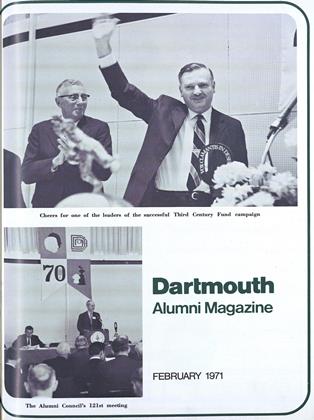LA FORMACIÓN DE LAS HACIENDAS AZUCARERAS Y LOS ORIGENES DEL APRA.
FEBRUARY 1971 MARYSA NAVARRO GERASSILA FORMACIÓN DE LAS HACIENDAS AZUCARERAS Y LOS ORIGENES DEL APRA. MARYSA NAVARRO GERASSI FEBRUARY 1971
By Peter Klaren '60. Peru: Francisco Moncloa Editores, 1970. 219 PP.130 soles ($3.25).
In recent years Peruvian politics have been largely shaped by the existence of PAP (Partido Aprista Peruano), a political party founded in 1930 by Victor Raul Haya de la Torre. Peter Klaren's study of the origin of PAP is a welcome addition to the already large bibliography dealing with the impact of PAP in Peru.
The rise of Haya de la Torre's party is usually viewed as another consequence of the economic depression that shook the Latin-American social fabric after 1929. Mr. Klaren has effectively challenged this interpretation by showing that the origins of PAP are to be found in the economic and social transformation brought about by the modernization of the sugar industry in the late nineteenth century.
The first chapters describe the system of land tenure in the sugar-producing regions, the gradual concentration of land in the hands of the Larco brothers, Juan Gildemeister, and the W. R. Grace Company in the 1870's, and the modernization of the sugar industry at a time when the European demand for sugar was high. Mr. Klaren goes on to analyze the economic and social effects of these transformations: the destruction of a traditional agrarian structure, the creation of a mass of salaried workers who will soon agitate for better working conditions, the disappearance of small farmers, and the changes which took place in the towns. He then shows how the PAP was founded by young intellectuals who came from this area and how the party recruited its members among the people whose lives had been deeply affected by the transformation of the sugar industry.
Mr. Klaren's book will interest not only Latin American specialists but also all those concerned with the impact of modern technology and foreign investments in the underdeveloped world.
Assistant Professor of History at DartmouthCollege, Mrs. Gerassi teaches courses concentrating on Latin America.
 View Full Issue
View Full Issue
More From This Issue
-
 Feature
FeatureTrustees and Alumni Council Hear 1970 Called "Great Year for Dartmouth"
February 1971 -
 Feature
FeatureThe Blackman Era: Sixteen Special Years
February 1971 By JACK DE GANGE -
 Feature
FeatureAlumni Council Nominates Three for College Trustees
February 1971 -
 Feature
FeatureAlumni Awards
February 1971 -
 Article
ArticleA Different View of Vietnam
February 1971 By STEPHEN HART '68 -
 Article
ArticleFaculty
February 1971 By WILLIAM R. MEYER
Books
-
 Books
BooksDEMOCRATIC GOVERNMENTS IN EUROPE:
October 1936 By A. H. Basye -
 Books
BooksCAVE DRAWINGS FOR THE FUTURE.
June 1954 By CHURCHILL P. LATHROP -
 Books
BooksTHE SOURCES OF "MUCH ADO ABOUT NOTHING,"
February 1951 By H. M. Dargan -
 Books
BooksKEEP YOUR HEAD DOWN
June 1945 By Herbert F. West '22 -
 Books
BooksTHE FOUR SEASONS OF SUCCESS.
FEBRUARY 1973 By ROBERT H. ROSS '38 -
 Books
BooksESPANA Y SU CIVILIZACION.
JULY 1965 By ROBERT H. RUSSELL


